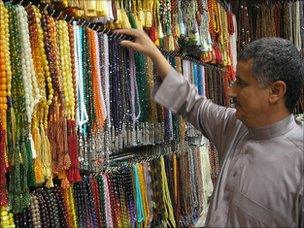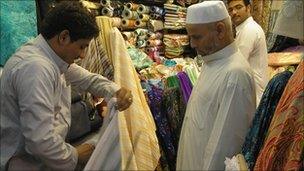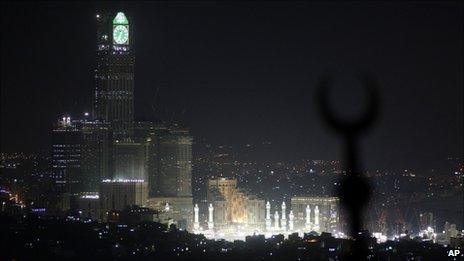Hajj pilgrims splash the cash at Mecca markets
- Published

Many sellers make enough profit during the Hajj season to last the whole year
Many Muslims around the world spend years saving for one trip - going to Mecca to perform the Hajj.
This is the traditional pilgrimage that any able-bodied Muslim must make at least once in a lifetime provided they can afford it.
Millions of people descend upon Mecca during Hajj season, some for the pilgrimage and some for business.
"Come close, come close, good price!" shouts a Yemeni boy as he braves the crowded streets of Mecca.
"I'll make discounts… Yalla, come on, Hajj!" he calls as he clears a spot for his large cardboard box stuffed full of T-shirts - no price tags of course - in a corner next to a busy bus station.
Street vendors from all over Saudi Arabia and the neighbouring countries come to the holy city to try to maximise their profits.
Some will make enough money in these few days to live on for the rest of the year.
At one of Mecca's most famous markets, Souq Gaza, I instantly go into shopping mode.
Everywhere you look, someone is selling something.
Hajj haggling
Women sit on pavements hawking stacks of prayer beads, men trade perfume oil and others flog cheap prayer rugs.
Everything about this market invites you to spend your money and the customers seem all too happy to part with their cash, though some are much better at getting a bargain than others.
Haggling is the norm and in some cases a necessity. Within reason, you can get anything you want here. Though much depends on how good a negotiator you are.
"We're the best hagglers, you know," says a Jordanian man I run into near a shop selling prayer beads.
"We Jordanians are quite good at this. We look at something we like, but we don't buy it right away. We go and have a look at other shops and get things at the price we like," he says.
"Prayer rugs and presents for his family advertised at 10 riyals, I could get for five," he says.
Mohamed Sharif, the owner of a textile shop in the souq, invites me in to sample his wares.

Haggling is very much expected before a purchase is agreed
Textiles are big business in Saudi Arabia and the rest of the Gulf, and Mr Sharif dismisses my concerns that prices are exaggerated during Hajj.
"This is a competition. Everyone wants to make money. Most of these people come and do the Hajj only once, so you either get them or you don't," he says.
"As you can see, many shops sell very similar products. If the customer is not satisfied with my prices, he goes elsewhere. That's why I always do discounts for this season."
Historically, Mecca has always been a commercial hub in the Arabian peninsula.
Located between two important trade centres - Lebanon and Syria in the north and Yemen in the south - it was always an essential trading stop.
This is still the case today. Trade is what people of Mecca do best.
Property deals
But today's noticeable boom in the holy city is not just a result of pilgrims buying trinkets at local shops.

The minarets of Mecca's Grand Mosque have been drawfed by developments
Real estate is proving to be a popular investment for Muslims who come to Mecca throughout the year for the smaller pilgrimage, Umra.
Once a mainly desert outpost, Mecca's Grand Mosque is now encircled by a concrete jungle made up of high-rise apartment blocks and five-star hotels.
The Mekkah Hilton, Raffles Makkah Place and the Intercontinental Mecca, all vie for prominence on the Mecca skyline.
Suites with a view of the Kaaba - the cube-shaped building towards which Muslims pray - cost up to 4700 riyals (£755; $1,200) a night.
And during Hajj season, these are fully booked.
- Published15 November 2010